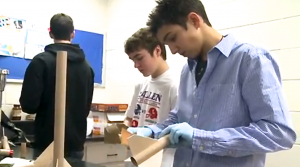"The Next Generation grant is allowing us to fund some positions that otherwise we would have a hard time doing because we wouldn’t be able to afford it," Coleman said.
[RELATED: $7 Million Dollar Grants Awarded to Help Boost College Readiness]
Danville began planning to shift towards a vision of school that veers away from testing and more towards project-based learning, one that balances content goals with character development goals, like nurturing students' ability to persevere, be leaders, and think independently. That's not easy to do in a state where teacher accountability and school ranking are based on test scores and results are published in the newspaper. "We don’t want to look bad," Coleman said. For its part, Gates Foundation has also focused its attention on measuring "effective teaching."
The district is seeking relief from some of the accountability requirements while pursuing a competency-based model of learning. The state Department of Education chose Danville as one of its Districts of Innovation, giving it a level of flexibility to experiment that most other Kentucky districts don't have. The $150,000 NGLC grant is allowing them to take advantage of that flexibility and act more quickly.
NGLC’s Calkins admits the entire endeavor is a learning experience. “A lot of what we’re funding them to do is to experiment with different ways to make this happen,” Calkins said. The hope is to come up with a number of different workable models that are both affordable and scalable.
Another district grantee, Lebanon School District in Pennsylvania, won the grant for its plan to expand a pilot blended learning program in its high school. All 1,300 Lebanon high school students will learn core subjects with a mix of online and in-person instruction. The district has many low-income students and superintendent Marianne Bartley is hopeful that the new blended approach will help teachers better reach individual learners at their own level.
A core part of NGLC's mission is to share the knowledge and discoveries broadly. Grantees sign contracts agreeing that what they produce will remain open source. Both Coleman and Bartley say they plan to access ideas of other like-minded educators with their school redesign plans.
Though technology has been the main thrust of focus for NGLC, Calkins said there's much more to the equation. “We were trying to help catalyze tech-enabled innovations related to the Common Core,” he said. The technology made a difference for some people, but Calkin said it didn’t provide the kind of systemic change NGLC was looking to create. “They weren’t going to produce the cohesive rethinking of educational design at the K-12 level that we felt was needed,” Calkins said.
Now, the organization is funding schools trying to restructure learning to be more student-centered, competency-based and that integrate technology in effective ways. “We’re hoping that at least some of them will become hugely influential to policymakers,” Calkin said. “They could visit and say this is what it could look like.”
POST-SECONDARY INVESTMENTS
NGLC also funds projects intended to help college students stay in school and graduate on time. Though the organization started off funding tech interventions, like using student data to help sequence classes and stay on track for graduation, now it's focusing on changing business practices of higher education to make it less expensive for students. For example, a Southern New Hampshire College initiative -- College For America -- charges students based on the amount of time they spend in school, not on credits taken. The competency-based model could allow a student to spend much less on college and is particularly targeted at adults who need to finish a degree they dropped earlier.
But not all projects have been successful. A grant to the MIT Media Lab to create a real-time math Olympics game challenge failed miserably, Calkins said. Schools couldn’t commit to participate in a project with set time boundaries and the challenge was set for April and May, when not all schools had covered the same content.
When projects do show some measure of success, the organizations that make up the NGLC use their extensive networks to spread the idea, offering professional development and outreach resources.
Diana Oblinger, president and CEO of EDUCAUSE, the lead organization in the NGLC partnership, said this part of their mission is crucial since the broad goal is to find solutions to big problems that work, are affordable and can be scaled up to address the needs many learners.


